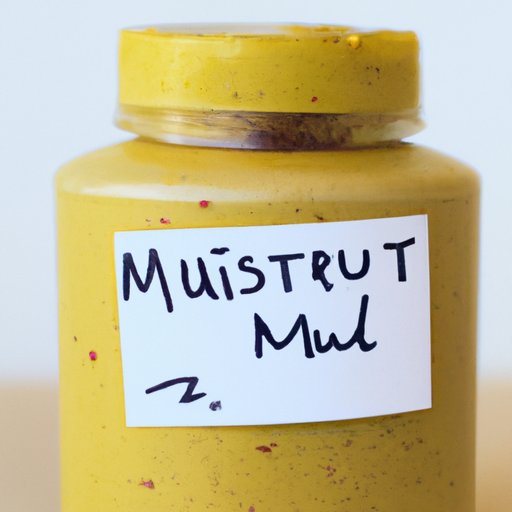
Introduction
Dijon mustard is a popular condiment known for its bold, tangy flavor and many culinary uses. But for those who follow a gluten-free diet, understanding whether or not dijon mustard is gluten-free is essential. In this article, we’ll explore everything you need to know about dijon mustard’s gluten-free status, as well as provide delicious gluten-free recipes and tips for safe eating out and shopping.
The Gluten-Free Guide to Dijon Mustard: Everything You Need to Know!
Dijon mustard originated in the city of Dijon, France, in the 19th century. It is made from brown mustard seeds, white wine, vinegar, and spices, giving it a distinctive flavor and aroma. While these ingredients are naturally gluten-free, some dijon mustard brands may contain hidden sources of gluten, such as wheat-based vinegar or additives. Therefore, it’s important to read food labels carefully and look for certified gluten-free dijon mustard.
To determine if dijon mustard is gluten-free, look for the gluten-free label or check the ingredient list for gluten-containing ingredients. If the label or list is unclear, contact the manufacturer for clarification.
Dijon mustard is a versatile and delicious ingredient in various dishes, ranging from salad dressings to marinades to sandwich spreads. Some of our favorite gluten-free recipes using dijon mustard include:
Apple Cider Vinaigrette
Combine 1/2 cup apple cider vinegar, 1/4 cup olive oil, 1 tablespoon honey, 2 teaspoons dijon mustard, and a pinch of salt and black pepper in a jar. Shake well and serve over your favorite salad greens and toppings.
Honey Mustard Chicken
Preheat oven to 375°F. Season chicken breasts with salt and black pepper, then coat with a mixture of 1/4 cup dijon mustard, 2 tablespoons honey, and 1 tablespoon olive oil. Bake for 25-30 minutes or until cooked through.
Grilled Shrimp skewers with Dijon mustard sauce
Thread shrimp onto skewers and brush with a mixture of 2 tablespoons melted butter, 2 tablespoons dijon mustard, 2 minced garlic cloves, and 2 tablespoons chopped fresh parsley. Grill for 3-4 minutes per side or until pink and slightly charred. Serve with additional dijon mustard sauce.
Roasted Carrots with Honey and Dijon Mustard
Preheat oven to 400°F. Toss 1 pound carrots with 2 tablespoons olive oil, 2 tablespoons dijon mustard, 2 tablespoons honey, and salt and black pepper. Roast for 25-30 minutes or until tender and caramelized.
Grain-Free Quiche
Whisk together 8 eggs, 1/2 cup almond milk, 2 tablespoons dijon mustard, 1/2 teaspoon baking powder, and a pinch of salt and black pepper in a bowl. Add in cooked bacon or ham, chopped vegetables, and shredded cheese. Pour into a greased pie dish and bake for 30-35 minutes or until set.
When dining out, communicating with the server and chef about your gluten-free needs is crucial. Ask questions about ingredient lists and preparation methods, and request that your food be cooked in a separate area to avoid cross-contamination.
The Hidden Dangers of Gluten in Mustard: How to Avoid Them
While dijon mustard’s main ingredients are gluten-free, some brands may sneak in sources of gluten, such as wheat starch, malt vinegar, or hydrolyzed wheat protein. It’s important to read food labels thoroughly and look for the gluten-free certification label.
When shopping for dijon mustard, some safe brands to consider include Maille, Grey Poupon, and Annie’s. Avoid brands that use hidden sources of gluten or don’t have clear labeling, such as French’s or Heinz.
Dijon Mustard: A Gluten-Free Alternative to Other Condiments
Dijon mustard is a great gluten-free alternative to other condiments such as ketchup, barbecue sauce, and soy sauce. It’s a flavorful way to add a zing to marinades, dressings, and dips.
To incorporate dijon mustard into your cooking and meal planning, try mixing it with olive oil and herbs for a simple vinaigrette, or using it as a rub for meat or fish. It’s also delicious spread on sandwiches or burgers.
The Little Mustard Seed that Could: How Dijon Mustard Became Gluten-Free
Dijon mustard has undergone many changes since its inception, including the development of gluten-free varieties. Manufacturers have recognized the growing demand for gluten-free foods and have responded with increasingly safe and high-quality products.
Today, dijon mustard is widely available in gluten-free varieties, making it a safe and delicious addition to any gluten-free kitchen.
A Guide to Reading Labels on Mustard: Understanding Gluten-Free Ingredients
When it comes to dijon mustard, there are several gluten-free ingredients to look for. These include vinegar made from gluten-free sources such as apple cider or rice, mustard seeds, salt, and spices. Avoid ingredients such as wheat, barley, malt vinegar, or wheat starch, which indicate the presence of gluten.
Understanding food labels and ingredient lists is essential for safe gluten-free shopping. Look for the gluten-free certification label or ingredients that are naturally gluten-free, and avoid brands that use hidden sources of gluten or unclear labeling.
Dijon Mustard and Gluten: The Facts You Need to Know
In summary, dijon mustard is a naturally gluten-free condiment made from mustard seeds, vinegar, and spices. However, some brands may include hidden sources of gluten, so it’s important to read labels carefully and look for certified gluten-free dijon mustard. Dijon mustard is a versatile and flavorful ingredient in many dishes, and can be used to substitute for other gluten-containing condiments. With this guide, you can confidently enjoy dijon mustard while following a gluten-free diet and living a healthy lifestyle.
Conclusion
We hope this article has provided valuable information and inspiration for gluten-free cooking and eating. Dijon mustard, when gluten-free certified, is a delicious and healthy condiment that can be used in various dishes and recipes. With careful planning, communication with restaurant staff, and safe shopping practices, you can enjoy gluten-free dijon mustard without compromising taste or nutrition.




